Feb 6, 2016 | News
|
Faculty of Bioethics Ateneo Pontificio Regina Apostolorum
Rome, Italy |
15th Annual International Bioethics Summer Course
15º Corso Estivo Internazionale di Aggiornamento in Bioetica
15º Curso de Verano Internacional de Actualización en Bioética
|
|
|
|

|
Current Challenges in Bioethics
Los desafíos actuales de la bioética
Le sfide della bioetica oggi
July 4-8, 2016
|
Family, Education and Society
Familia, vida y sociedad
Famiglia, Educazione e Società
July 11-15, 2016
|
|
|
Introductory course for those who would like to have a greater comprehension of bioethics principles and different bioethical issues.
Un curso introductorio para aquellos que quieran tener una mayor comprensión de los principios y las cuestiones de bioética.
Un corso introduttivo offerto a chi vuole avere una maggiore consapevolezza dei principi bioetici e degli argomenti a essi correlati. |
The purpose of this monothematic course is to reflect on the family, which is founded on marriage, and functions as the “cradle” of life and the “original cell” of social life.
Un curso monográfico para reflexionar sobre la familia fundada sobre el matrimonio como célula de la vida y célula originaria de la vida social.
Un corso monografico per riflettere sulla famiglia fondata sul matrimonio come culla della vita e cellula originaria della vita sociale. |
|
|
Full scholarships available for university students.
Están disponibles becas para estudiantes universitarios.
Sono disponibili borse di studio per gli studenti universitari.
|
|
|
Via Aldobrandeschi, 190 – 00163 – Rome – Italy
Tel. +39 06 91689931
www.upra.org
info.bioetica@upra.org |
|
Jan 20, 2016 | News
The UNESCO Chair in Bioethics and Human Rights recently formalized its sponsorship of the diploma program of the Institute of Bioethics in the Universidad Finis Terrae in Santiago, Chile.
The diploma program seeks to form in professional educators the competencies necessary to understand the nature of bioethics as an interdisciplinary discipline that analyses scientific and philosophical issues. The program also seeks to integrate these diverse fields of knowledge to transmit a unified vision to different social contexts and educational levels.
For more information on the program, visit the official site here.
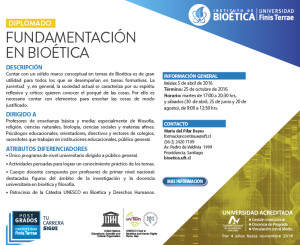
Nov 27, 2015 | News
by Josefa Cameron
On November 26th, the Pontifical University Regina Apostolorum and the European University of Rome in collaboration with the UNESCO Chair of Bioethics and Human Rights held the conference “Agricultural development and the fight against hunger. The call of Pope Francis’ encyclical Laudato si’.” The conference hosted a plethora of professors and representatives that spoke on issues concerning agricultural development and the fight to end hunger in reference to Pope Francis’ Encyclical letter, Laudato Si’.
Watch Alberto Garcia’s interview about the event with Telepace below at 16:40-20:00:
“What happens in a small village in Africa can have a ripple effect that reaches Europe and beyond,” said he President of the International Fund for Agricultural Development (IFAD), Kanayo F. Nwanze. He explained that today’s “problems and solutions are not limited by geographic or political boundaries.” Further information regarding his intervention can be read at the IFAD’s website here.
Professor Michael Ryan who spoke on development and decline, expressed the highlights he has taken away from the day’s events, “One thing that stands out to me is the need for all of us to continue working, reading, and investigating more deeply into the richness of Laudato Si’”. Through observing the panel of speaker and their interpretations, Ryan explained that the conference acted as an invitation for him to continue his own study, “the encyclical has a richness that you do not notice the first time you go over it, it is like walking on top of a gold mine, you probably do not realize what is under your feet”.
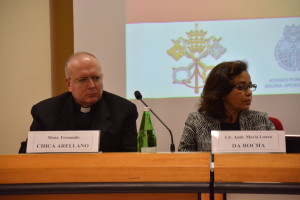
Professor Joseph Tham, Dean of the Faculty of Bioethics, discussed the topic of technoscience, technoethics, and technocracy. Through his interpretation of Laudato Si’, Tham suggested that the main message of the encyclical involves, “the question of technology and the problems that arise due to it. We live in a very technological society, we can forget that we are part of something bigger, that we are creatures and that technologies are a means to help us live more comfortable lives. However, technology can also damage us, damage society, and damage the environment.”
Regarding what subjects hoisted interest for further investigation, Tham found interest in the subject of ecological conversion, “somehow we need to change our mentality and to recognize that we cannot continue exploiting and manipulating nature as if it were disposable”. Tham pointed out that, “The call for this conversion is to appreciate that we are related in some way, it is an interelationality between God, nature, and man.”
Tham also took particular notice on the discourse of power that was considered during the panel, “we all want some element of power and to be able to control our surroundings. In a way, this is a cause of the problem because the desire for power leads to conflict.” Through this desire to control our environment, solutions regarding its wellbeing are overlooked and we ultimately damage it and ourselves. Pope Francis’ Laudato Si’ can be deemed as a response to this environmental dilemma caused by human recklessness. Tham noted that, “We need to analyze what is true power. I, personally, think true power is to be humble and to respect our environment.”
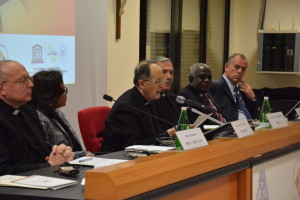
Nov 19, 2015 | News
UNESCO Chair Director Alberto García signed a framework agreement for ongoing collaboration with the Universidad Finis Terrae in Santiago, Chile on November 19, 2015.
The accord was signed the same day García spoke delivered the introductory address of an interdisciplinary conference on “The reception of the encyclical Laudato Si’ from an ecological, philosophical, and irreligious perspective.” A full schedule of the participants can be found at the end of this article. The following is an interview with García regarding the importance of the event.
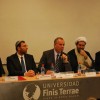
What benefits will bring to the University perform this type of collaboration agreements?
The agreement we have signed today a memorandum of understanding or a letter of intent to start a direct and immediate link on projects in education, research and dissemination of knowledge in bioethics, in light of human rights based on what we share all human beings irrespective of our culture, our religion or our scientific or technological background. Through the UNESCO Chair and the University Finis Terrae, we will engage primarily in four areas of interest always looking for the art of convergence and cooperation in the field of global ethics: Neureobioethics; Bioethics, Multiculturalism and Religion; Bioethics and Global Art, which will imply the participation of the Universidad Finis Terrae in an international Bioethics Art Competition (www.bioethicsart.org), that inspires artists to produce works of art with values that respect human dignity and fundamental rights and duties of individuals. Finally, Bioethics and Human Ecology, which is precisely the issue that brought us to this seminar today.
What is the importance of such meetings?
The fundamental importance is that with emerging problems we have in Chile and around the world, it is important to call people with different professional expertise in different branches of knowledge (scientists, theologians, philosophers, jurists, sociologists, etc.) to engage in a constructive reflection on an event, such as the encyclical of Pope Francisco. To the extent that we encourage such meetings, in an atmosphere of diversity and with people like those who have participated in today’s event, we will be able to propose solutions that will be more effective, more democratic, and better for the common good.
Did you think that it would generate a large gathering?
I knew the Universidad Finis Terrae from a distance and knew that it had the ability to host great gatherings. However, I really was surprised by the variety of people who came, their different backgrounds, people of different philosophical and intellectual areas of high caliber and people who are committed to caring for the environment. I think that such a gathering reflects the true capacity of irradiation the university has in today’s society.
Do you think there will be any change in the perspectives of the audience?
Certainly, but not only through what was said. The symposium, which I think was very interesting, was extremely enriching thanks to other speaks and to the questions and comments from the public. First, I think people will leave this activity and will read the Laudato Si’ encyclical itself, which is very important. Second, it shows that you can be interested in the social thought of the Catholic Church, which is enormously rich for believers and nonbelievers. Third, it will awaken in each small commitments in their own families or in their work environments.
In line with its constant commitment to bioethics, multiculturalism, and interreligious dialogue, the Chair is preparing a similar gathering of diverse thinkers to discuss the same Papal document from various disciplinary and cultural perspectives on November 26 in Rome. The Rome gathering will focus on collaboration among various cultures and religions in the fight against hunger and will feature the presence of representatives the Permanent Observer Mission of the Holy See to the United Nations. To read more about the “Agricultural development and the fight against hunger” event, click here.
Click the image below to see a full list of the participants.
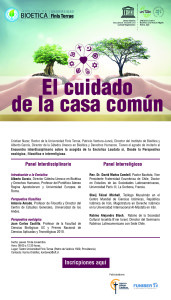
Nov 8, 2015 | News
“Agricultural development and the fight against hunger. The call of Pope Francis’ encyclical Laudato si’.”
November 26, 2015 at the Pontifical University Regina Apostolorum and the European University of Rome.
The meeting is sponsored by the Permanent Observer Mission of the Holy See to the United Nations together with the Pontifical Athenaeum Regina Apostolorum and the European University of Rome and in collaboration with the UNESCO Chair in Bioethics and Human Rights.
On 26 November 2015 the international conference “Agricultural development and the fight against hunger. The call of Pope Francis’ encyclical Laudato si’“ will be held at the Pontifical Athenaeum Regina Apostolorum and the European University of Rome. The meeting is sponsored by the Permanent Observer Mission of the Holy See to the United Nations together with the Pontifical Athenaeum Regina Apostolorum and the European University of Rome and in collaboration with the UNESCO Chair in Bioethics and Human Rights. The goal is to raise awareness and deepen the thought of Pope Francis’ recent encyclical Laudato si’ and his call for a conversion to an integral ecology for a solicitus care of the natural and social environment in which we live.
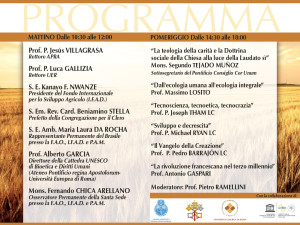
“I’m quite happy with this initiative,” said Father Jesus Villagrasa LC, Rector of Regina Apostolorum “for two reasons: first, because the morning meeting touches the main concern that I believe it was in the heart of the Pope when he wrote the encyclical. He himself, in the recent interview in Paris Match, said that he had started the encyclical Laudato si’ in the words of the Cantico delle creature, because he wanted to show the profound links that exist between the commitment to eradicate poverty and care for creation. Second, because in the afternoon session there will be university professors to deepen the doctrinal richness of the Encyclical.”
The Rector of the European University of Rome, Father Luke Gallizia LC, said: “The theme of the conference is of particular importance to the cultural moment that we are living and also for the mission of a university. Pope Francis has explored deeply, in the encyclical letter Laudato si’ the technocratic paradigm that dominates our post-modern culture. While recognizing the value of scientific research and the benefits that the recent discoveries, especially in the last two centuries, have contributed to the solution of many of humanity’s problems, the Holy Father underlines the risk that this enormous power should turn against man, if it is not accompanied by the development of the human being with regard to his responsibility, values and conscience.”
What happens in our “common home” is even more alarming. We face an environmental crisis without precedent. The cry of the people suffering hunger in the world is today, more than ever, an ethical and political imperative. It important that the new generation finds its vocation in a real ecological citizenship. At the same time, we seek a more effective international cooperation to encounter the poorest people and those in grave difficulty.
Laudato si’ is a document that flows from the fertile river that is the patrimony of the Church’s social doctrine. Nevertheless, there are many scientific, technological, philosophical, theological, and social challenges the we must still face from the perspective of integral humanism and solidarity, so that Catholics, but not only Catholics, can carry on a social ministry more that is more effective, open to all and with the participation of all. We must build bridges and be a leaven in society so that we can make a responsible and effective contribution to society. We need a commitment that comes from a mind and a heart of solidarity, focused on the excellent way of love and charity towards others, especially towards the most vulnerable in our society.
The Permanent Observer Mission of the Holy See to the United Nations is committed to creative and proactive dialogue in the international community. Evidence of this is its contribution in organizing this conference, in which the university intends to offer information and inspiration to people of good will who are working for the common good. In this regard, it is important to remember that care for our common home is task for all. The environment is the heritage of humanity. To fight against hunger, we first need to defeat egoism, atrocious individualism that locks us in ourselves, that creates self-centeredness and separates us away from the other, shattering fraternity and creating rivalry.
On the theme of the meeting, Prof. Alberto García, director of the UNESCO Chair in Bioethics and Human Rights, said: “Our globalized world needs men and women with competence and virtue able to assume the commitment of caring for our common home. Creative people are able to find convergence in the ideas, talent and resources that point towards the common good. With dedication, optimism and mutual respect for each other, now is the time of transcendence out of ourselves, to look to the other. Today is the time to make a commitment of solidarity in favor of others, not of nostalgia and sterile complaints.”
For information about the conference you can visit:
www.uprait.org
www.unier.it
Michela Coluzzi
Head of Press and Institutional Communication of the Pontifical Regina Apostolorum
E-mail: mcoluzzi@upra.org – 3929009683
Carlo Climati
Press Office of the European University of Rome
E-mail: carlo.climati@unier.it – 06 665 431.







